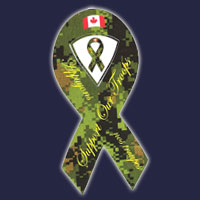
The bodies of Canada's latest fallen soldiers in Afghanistan are expected to return home Tuesday afternoon.
Master Cpl. Kristal Giesebrecht, 34, and Pte. Andrew Miller, 21, were killed Saturday when their armoured vehicle was struck by an improved explosive device in Afghanistan's Panjwaii District, about 20 kilometres southwest of Kandahar City.
The two medics from Canadian Forces Base Petawawa - about 160 kilometres northwest of Ottawa - are the 149th and 150th Canadian soldiers to be killed in Afghanistan since Canada entered combat there in 2002. They were the sixth and seventh medics to die in Afghanistan and the 11th and 12th Canadians to die there in 2010.
Giesebrecht, who was married and leaves behind a stepson, is the third female soldier to die while deployed for Canada in the war-torn nation. She was serving her second tour in Afghanistan.
Miller, who was from Sudbury, Ont., was with 2 Field Ambulance, while Giesebrecht - who called Wallaceburg, Ont., home - was from 1 Canadian Field Hospital. Both units were based in Petawawa.
He is survived by his mother, Wendy Miller, his father, Raymond Ealdama, two sisters, a brother and his girlfriend, Staci Jessup - "his soulmate."
In a statement released Monday, Miller's family said he was "proudly following in his father's footsteps, initially into the military and then by deploying to Afghanistan."
Miller's father, a member of the Greater Sudbury Police Service, served in Afghanistan in 2008 as part of the Canadian Civilian Police training contingent in Kandahar City.
"Andrew believed strongly in the mission and went to Afghanistan knowing he was making a difference for the Afghan people," the statement said. "Andrew loved his job and died upholding his beliefs and values in the service of his country."
Another Canadian soldier was injured in the blast, but was listed in stable condition.
At the time the soldiers were killed, Giesebrecht, Miller and other Canadian troops were responding to a call for help from an Afghan family whose doorway had been rigged by the Taliban with an improvised explosive device.
The repatriation ceremony is scheduled to take place at 2 p.m. Tuesday at Canadian Forces Base Trenton.
In addition to the families of the two fallen soldiers, Defence Minister Peter MacKay and Chief of Defence Staff Gen. Walt Natynczyk are also expected to attend.
© Copyright (c) CW Media Inc.




